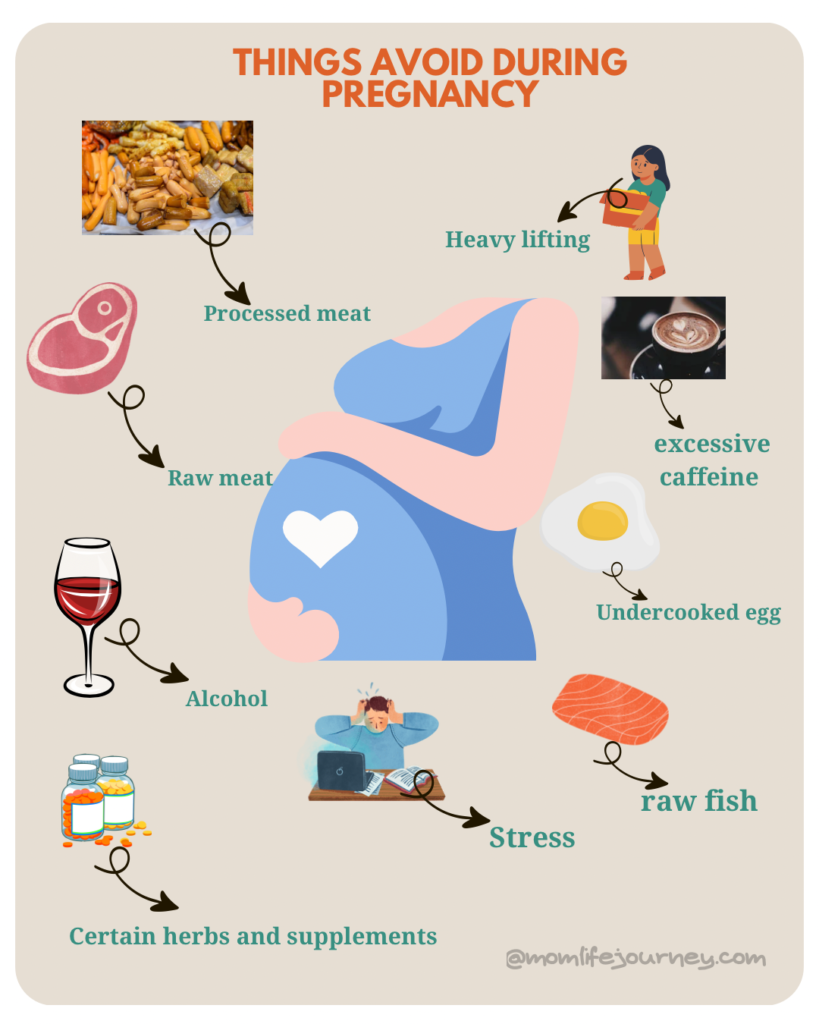
Things avoid during pregnancy is must because during pregnancy, a woman’s body undergoes significant changes to support the developing baby, but it also requires careful consideration of lifestyle and habits to ensure the health and well-being of both the mother and the baby. Here are key things to avoid during pregnancy:
Foods and Beverages
Raw and Undercooked Foods:
Avoid raw or undercooked meat, poultry, seafood, and eggs due to the risk of harmful bacteria such as Salmonella, E. coli, and Listeria, which can cause severe infections and complications.
Certain Fish
High-mercury fish like shark, swordfish, king mackerel, and tilefish should be avoided because mercury can harm the baby’s developing nervous system. Opt for low-mercury fish like salmon, shrimp, and canned light tuna, but limit intake to 2-3 servings per week.
Unpasteurized Dairy Products:
Steer clear of unpasteurized milk and cheeses as they can contain Listeria, which can lead to miscarriage, stillbirth, or severe illness in newborns.
Alcohol:
No amount of alcohol is safe during pregnancy. Alcohol consumption can cause Fetal Alcohol Spectrum Disorders (FASDs), leading to developmental and intellectual disabilities in the child.
Caffeine:
High caffeine intake is linked to an increased risk of miscarriage and low birth weight. Limit caffeine consumption to less than 200 mg per day (about one 12-ounce cup of coffee).
Physical Risks
High-Risk Sports and Activities:
Avoid activities that carry a risk of falling or abdominal trauma, such as horseback riding, skiing, surfing, and contact sports. Also, steer clear of activities that involve high altitudes or deep diving.
Hot Tubs and Saunas:
This increases the body temperature, especially in the first trimester, and can increase the risk of neural tube defects. Avoid hot tubs, saunas, and overly hot baths.
Heavy Lifting:
Lifting heavy objects can cause strain on the back and abdomen. If lifting is necessary, use proper techniques and avoid lifting from the ground or above shoulder height.
Lifestyle Factors
Excessive Weight Gain:
Gaining too much weight during pregnancy can lead to complications such as gestational diabetes, preeclampsia, and a higher risk of needing a cesarean section. Follow a balanced diet and engage in regular, moderate exercise.
Stress:
Stress during pregnancy is not uncommon, but chronic or severe stress can have significant negative impacts on both the mother and the developing baby. Chronic stress can negatively affect pregnancy outcomes. Practice stress-reducing techniques such as prenatal yoga, meditation, and regular rest.
Tobacco:
Smoking during pregnancy poses serious risks to both the mother and the developing baby. The harmful chemicals in cigarettes, including nicotine, carbon monoxide, and tar, can lead to complications and long-term health issues.It can lead to premature birth, low birth weight, stillbirth, and sudden infant death syndrome (SIDS). Quitting smoking and avoiding smoky environments is crucial.
Over-the-Counter Pain Relievers:
Avoid taking tablets like ibuprofen and aspirin, especially in the third trimester, unless prescribed by a healthcare provider.
Travel Concerns
Long Flights and Car Trips:
If travel is necessary then only you should travel, take frequent breaks to walk and stretch, stay hydrated, and wear compression stockings if recommended by a healthcare provider.And also discuss with the health care advisor before planning any travel.
Travel to Areas with Zika Virus:
Avoid traveling to regions where Zika virus is prevalent, as infection during pregnancy can cause severe birth defects, including microcephaly. If travel is unavoidable, take strict measures to prevent mosquito bites.
Cosmetic Treatments
Certain Beauty Treatments:
Avoid hair dyes that contain chemicals, and also avoid tanning beds which is a machine used to produce an artificial tan by imitating the sun’s ultraviolet (UV) radiation. and certain skincare products containing retinoids or high levels of salicylic acid. These can be absorbed through the skin and potentially harm the baby. Opt for pregnancy-safe alternatives.
Tattooing and Piercing:
Postpone getting tattoos or piercings until after pregnancy due to the risk of infections and complications.
Content is really amazing and helpful.